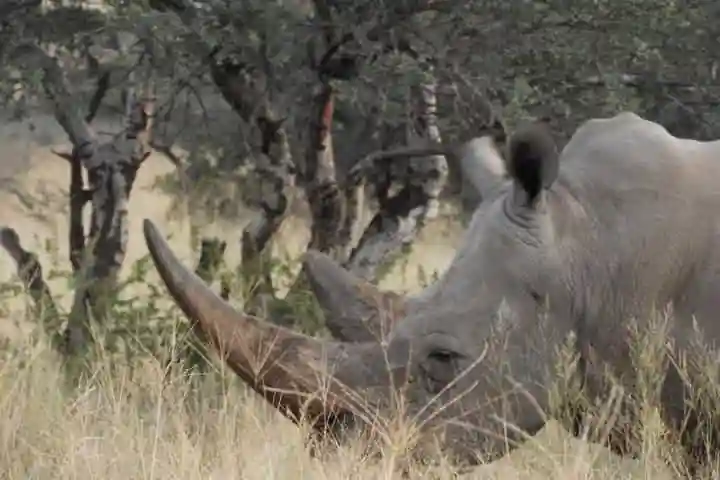

In an effort to protect rhinoceros in South Africa, scientists are studying ways to inject their horn with radioactive material to deter poachers from hunting them
<p>
<strong>With rampant illegal killing of rhinoceros going on, authorities are seized on how to protect them from poachers. Now, scientists of South Africa are studying ways to inject radioactive material in the horns of these animals. The idea is to make it easier to detect them at the border post, when they are shipped out illegally.</strong></p>
<p>
The researchers feel that this move will discourage poaching.</p>
<p>
The poachers have already killed 249 rhinos in South Africa in the first six months of this year. The figure is alarming as it is 83 more than what was in the first half of 2020.</p>
<p>
The main reason for the indiscriminate slaughter of rhinos is because of their horns. These are smuggled to Asia, a region where it fetches high prices as they are considered important for traditional and medicinal purposes.</p>
<p>
<strong>Also read: <a href="https://www.indianarrative.com/science-news/study-of-rhinoceros-genetics-will-help-boost-their-dwindling-population-111677.html">Study of rhinoceros genetics will help boost their dwindling population</a></strong></p>
<p>
According to James Larkin, a nuclear researcher at the University of the Witwatersrand, injecting rhino horns with a small amount of radioactive material might deter poachers by making smuggling easier to detect.</p>
<p>
At a webinar hosted by the World Nuclear Association, Larkin disclosed that more than 11,000 radiation detectors are installed at ports and airports around the world. Also border agents are equipped with handheld radiation detectors that will help them to identify and detect the contraband, he added.</p>
<p>
&quot;We can radically increase the army of people who are capable of intercepting these horns… to push back against the smugglers,&rdquo; said Larkin.</p>
<p>
<strong>Also read: <a href="https://www.indianarrative.com/latest-news/sa-national-parks-welcome-yr-sentence-to-poachers-112483.html">SA National Parks welcome 105 yr sentence to poachers</a></strong></p>
<p>
In fact already two of these animals have been injected with a non-radioactive isotope. This will ensure their safety while also making sure that the material does not travel into their bodies or cause any health problems for both the animals or humans.</p>
<p>
In order to determine the appropriate dose, computer modelling will be done. In this a model rhino head will be built with a 3D printer to test the doses before the trial moves to real rhinos.</p>
<p>
This programme has been named as The Rhisotope Project and it is being backed by Rosatom, Russia&rsquo;s state-owned nuclear company and also researchers in the United States and Australia.</p>
Prime Minister Narendra Modi hailed Indian chess grandmaster Divya Deshmukh for defeating world number one…
The family of detained Baloch leader Mahrang Baloch has accused prison authorities at Quetta's Hudda…
The QS World University 2026 Rankings bring great news for our education sector, as the…
Speaking at the India Global Forum, Union Minister of Commerce and Industry, Piyush Goyal, says…
Amid the ongoing conflict with Iran, Israel's Foreign Ministry said on Thursday that Soroka Hospital…
India's foreign engagements have entered a new phase of dynamism and purpose, driven by its…